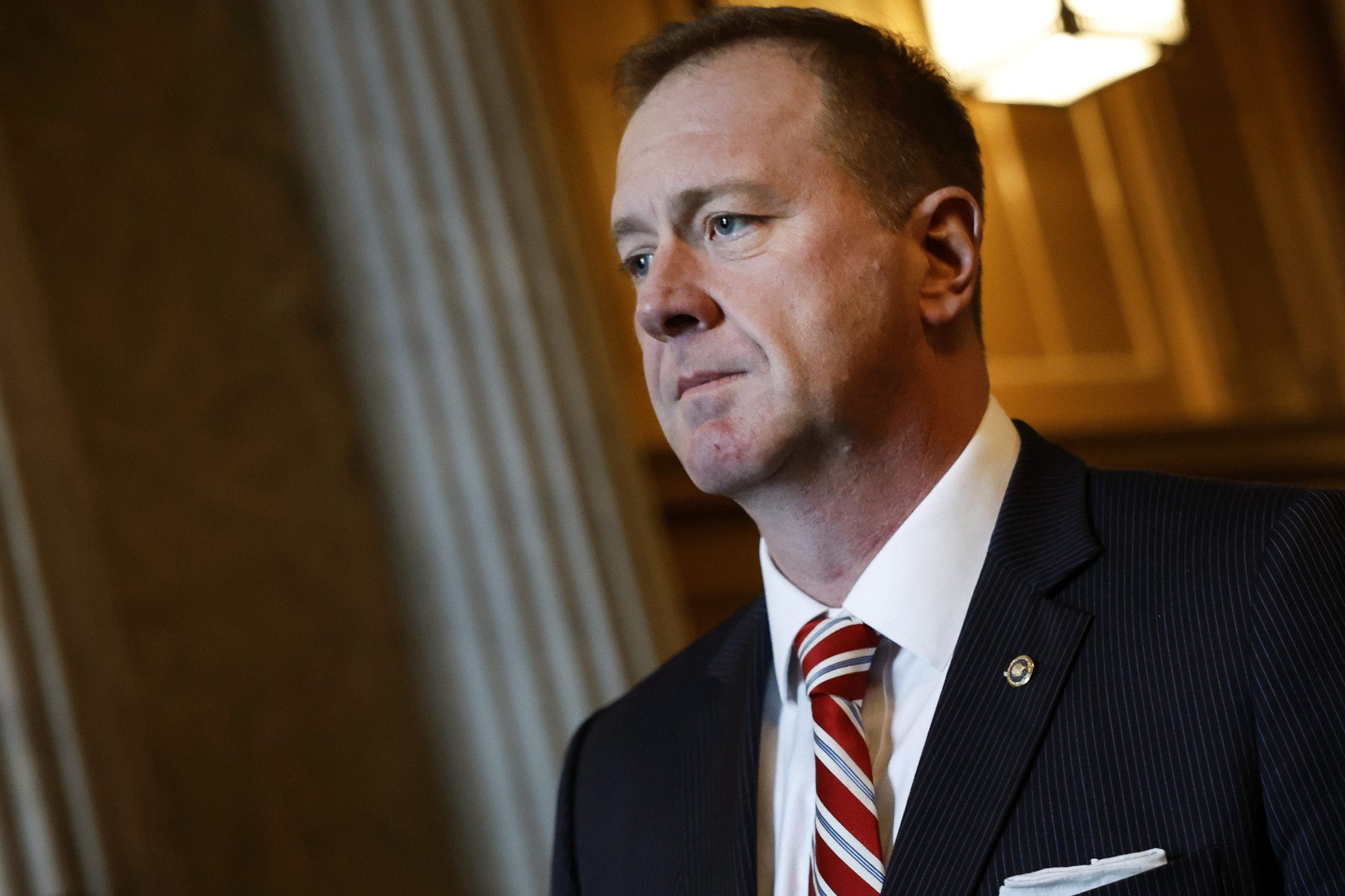In the days following Maine’s worst forever chemical spill, crews scrambled to clean up tens of thousands of gallons of toxic firefighting foam from the former Brunswick Naval Air Station before it could taint nearby private drinking wells or the public water supply.
Nobody cared what crews did with the waste, so long as they took it far, far away from Maine.
“Not many questions were asked,” admits Steve Levesque, who took over as acting head of the agency in charge of redeveloping the base after the spill. “It was like, just get it out of here, you know? We wanted it gone as fast as possible, so it couldn’t hurt anyone.”
About half of it wound up at an incinerator three miles from the Ontario home of 2nd-generation farmer Lori Vokes. She doesn’t know much about forever chemicals, but she can see the incinerator smokestack and smell its sprawling landfill from her white brick farmhouse.
She didn’t know Maine was sending its toxic chemicals there to be incinerated, but she wasn’t surprised. She knows most of the waste that Clean Harbors Canada burns and buries at the facility comes from far away. She feels resigned to breathing in what comes out of its smokestack.
“I used to fight, but I’ve given up,” Vokes said. “I am tied to this land. There is no place for me to hide.”
She has a message for Maine: “Clean up your own mess. Don’t send it here.”
Like many states, Maine is struggling to determine how to dispose of its stockpile of toxic aqueous film-forming foam, or AFFF, stored in its fire stations, airports, military bases, oil terminals and paper mills. The chemicals used to make the foam are essentially liquid forever chemicals.
The most common disposal methods — incineration, landfilling and deep underground storage — all have drawbacks. Until scientists find safer solutions, states like Maine must wrestle with the ethics of sending dangerous waste like AFFF away to be burned, buried or banked, often in poor communities of color.
Newly released public records show the cleanup company, Boston-based Clean Harbors, trucked 12,500 gallons of foam and tainted rinse water to its incinerator outside Sarnia, Ontario, and 10,000 gallons to its El Dorado incinerator, a poor, majority-minority company town in Arkansas.
Per- and polyfluoroalkyl substances, or PFAS, get that nickname because of the strong carbon-fluoride bonds that don’t degrade on their own, making the chemical extremely resistant to heat, water and grease and ideal for coating nonstick pans, making semiconductors and fighting fuel fires.
But even trace amounts of some PFAS compounds pose a public health risk, according to medical researchers and federal regulators. High exposure over a long time can cause cancer. Exposure during critical life stages such as early childhood can cause life-changing harms, including suppressed vaccine response.
Because of the risks, Maine and many federal agencies, including the Federal Aviation Administration and Department of Defense, are switching to fluorine-free foams, although that market is new and the cost of buying new equipment and training firefighters to use the new foam can be high.
And then there is the disposal issue. Maine doesn’t know exactly how much AFFF is out there, but the Maine Department of Environmental Protection estimates it would cost about $2.3 million to incinerate the 48,000 gallons it believes is stored in tanks, barrels and totes across the state.
In 2021, Maine banned the manufacture and sale of AFFF for anyone not federally required to have it on hand, including airports like Brunswick Executive Airport and defense contractors like Bath Iron Works. But even those parties were required to switch once they were no longer so required.
That law also requires manufacturers of AFFF sold before it went into effect to reimburse Maine buyers for their purchase to help defray the costs of buying new PFAS-free foam and disposal of AFFF, but years-old receipts are hard to find, and many AFFF manufacturers are defunct.
Levesque doesn’t know what the Midcoast Regional Redevelopment Authority paid Clean Harbors to incinerate the 22,500 gallons of foam and rinsate removed from Brunswick. The Boston-based firm has billed him $551,000 to date, but that covers all of its services, from site cleanup to equipment rental to emergency workers’ hotel costs.
Agency records show $91,891 billed over two October dates for “disposal service,” but Levesque doesn’t know if that represents the incineration charge, incineration and the landfilling of any leftover ash, or a totally separate disposal fee for used emergency crew protective gear.
He didn’t even know where the incineration occurred, or when. He just took over at MRRA — a job he held for 16 years before retiring in 2021 — but he thought the waste went to Texas, something the former director said in the days following the spill.
Even the U.S. Environmental Protection Agency thought it went to Texas. But then again, MRRA and Clean Harbors didn’t have to tell the EPA what it did with it because the transport and incineration of PFAS aren’t regulated.
There is also no requirement to even test for PFAS emissions at incinerators, much less limit them.
IS INCINERATION A SOLUTION, OR ANOTHER PROBLEM?
Clean Harbors claims it can destroy 99.99% of PFAS through incineration. It cites a third-party study it commissioned to prove its methods safe and effective.
Environmentalists say some PFAS can survive the incineration process, escape the smokestack and then rain back down on the soil, water and people living near the incinerators. They cite studies that found PFAS in soil and water near incinerators that burn AFFF in both New York and Ohio.
As a result, the town where the U.S. Department of Defense was incinerating its East Coast stockpile of AFFF tried to ban the practice. The DOD paused the practice and Congress tucked a PFAS incineration moratorium into its spending bill. It is still in a newly reauthorized funding law, although the military wanted to see it gone.
Incineration isn’t the only option. It could be buried in a landfill, injected into deep wells or broken down in a sort of pressure cooker, with a dash of oxygen (supercritical water oxidation). In theory, it could be broken down in an electrochemical cell or by high-energy milling.
In its latest guidance, the EPA reviewed the pros and cons of each option but did not cite a preferred disposal method, saying none were perfect and all needed more study. In the past, it called incineration a last resort, worried that it didn’t destroy all PFAS and created harmful byproducts.
Thermal destruction methods have improved since then, but EPA still has questions about incineration, and whether tests that companies like Clean Harbors cite as proof its methods are effective and safe are done right and prove all PFAS are completely and permanently destroyed.
Until then, EPA appears to suggest those with storage options wait and see how the research shakes out.
Maine DEP Commissioner Melanie Loyzim said she is unconvinced that incineration, even at super high temperatures, can destroy all PFAS permanently and worries about the creation of potentially harmful byproducts. She also is quick to say things are changing quickly.
Loyzim doesn’t want to “pass the buck” by sending Maine’s unwanted waste to some other place. After all, Maine doesn’t like it when the tables are turned. In 2022, lawmakers banned out-of-state waste from its landfills. (Although that ban is paused to avoid the collapse of a state landfill flooded by PFAS-laden sewage sludge.)
Studies have repeatedly shown hazardous waste incinerators are built in poor communities of color that face other environmental hardships — places like Sarnia, Ontario, home to dozens of petrochemical plants and a First Nation reserve, or El Dorado, Arkansas, a majority Black, struggling former oil town.
If incineration does create fugitive PFAS emissions, then they will fall back down on the soil, streams and vulnerable people who live nearby and are already dealing with environmental problems, and could wind up in the already compromised groundwater, drinking wells or farm fields and food.
A 2022 University of Kentucky study by environmental health professor Erin Hayes found elevated PFAS levels in every soil sample collected from a neighborhood abutting an eastern Ohio incinerator that has burned about 2,600 tons of forever chemicals dating back to 2018.
In 2020, a Bennington College environmental studies class discovered elevated PFAS levels in soil and water at an upstate New York incinerator burning PFAS-laden firefighting foam for the U.S. Department of Defense. Tests showed PFAS levels were higher downwind than upwind.
The professor claimed his findings proved that high-temperature incineration doesn’t work. Both the state and the company criticized the findings, but the data and the resulting public outcry led to a ban on foam incineration there and the state to fine the company for unrelated dust violations.
“There’s still a lot we don’t know,” Loyzim said. “We’ve been trying to figure out how to safely dispose of a foam that can no longer be legally sold in Maine since 2019, but the technology just hasn’t been there. Until Brunswick, we’d been asking those who had it to store it in a safe place.”
Waiting may not be an option after Brunswick. State Rep. Dan Ankeles, D-Brunswick, said the Aug. 19 fire suppression system malfunction that flooded the Brunswick Landing community with 51,450 gallons of AFFF foam is proof that the state’s “storage in place” approach isn’t safe.
Ankeles is proposing legislation to launch a state takeback program. The bill is still being fine-tuned, and Ankeles said he is working with DEP to address the disposal issue. Loyzim has said that Maine doesn’t have a single facility available to safely store all of Maine’s AFFF in one place.
In 2022, DEP asked Clean Harbors to provide it with an estimate for such a program, plus incineration. In Connecticut, it charged $1 million to collect 40,000 gallons of AFFF from 250 fire stations. In Maine, it estimated a $2.3 million price tag: $240 per 5-gallon barrel, plus $400 for each pickup location.
Loyzim said she would rather do what New Hampshire is doing and send the state’s unwanted stockpile of AFFF off to Ohio to be destroyed through supercritical water oxidization. New Hampshire expects to pay $668,000 to Revive Environmental to destroy 10,000 gallons of AFFF with its “PFAS Annihalator.”
Sen. Stacy Brenner, D-Scarborough, strongly believes the responsibility for disposing of the toxic foam rests with the manufacturers, many of whom kept selling AFFF even after they realized it was harmful, not the unwitting consumers who bought it to fight the kind of fires that burn hottest.
Last year, Maine became the latest of more than a dozen states to file suit against more than a dozen PFAS manufacturers, including foam-makers, alleging that the companies knew in the 1950s that the products were toxic but didn’t disclose that information to the public.
“Think about the profit derived from that production and who was aware the foam was harmful,” said Brenner, who co-chaired the environment committee last legislative session. “We need to think about culpability so we can afford the cleanup, because it shouldn’t fall on the backs of taxpayers.”
Lawmakers will undoubtedly worry about the cost of disposal, as well as how much it would cost to help fire departments pay for PFAS-free replacement foams. But they also will have to confront the ethics of sending waste to poor, minority communities that are disproportionately impacted by pollution.
‘WE DON’T BUILD INCINERATORS IN … MIDDLE-CLASS NEIGHBORHOODS’
The Sarnia incinerator is about six miles from the Aamjiwnaang First Nation reserve, where 900 of the tribe’s 2,500 members live in the shadow of dozens of petrochemical plants.
In April, Aamjiwnaang declared a state of emergency after community residents got sick from what was believed to be exposure to benzene, a cancer-causing chemical used to make plastic. The tribe blamed it on a neighboring chemical manufacturer. The factory denied it, but then announced it will close in 2026.
Clean Harbors operates in a very different world in El Dorado, Arkansas, where EPA records show the facility appears to have incinerated more shipments of PFAS since 2018 than any other in the U.S. It is just 2-1/2 miles from City Hall and almost nobody seems to mind.
About a 20-minute drive from the Louisiana border, this community of 17,000 is a company town. Until 2020, El Dorado was home to Murphy Oil, the company that runs Walmart gas stations. Murphy built a local arts center, college dorm and baseball field, and set up a free college tuition program for locals.
Once the richest town in the state, El Dorado has fallen on hard times since the oil dried up in the 1990s.
Census data paints this picture: El Dorado is majority-minority (55% non-white), undereducated (13% didn’t graduate high school) and now poor (per capita income of $25,624 and 24% live in poverty). In contrast, the state as a whole is 78% white, has a per capita income of $33,147 and a 16% poverty rate.
Conditions get more challenging the closer you get to the plant. According to the EPA, which tracks the populations living near regulated facilities, the population within a mile of the El Dorado plant is 69% minority, has $20,076 per capita income and 23% didn’t graduate from high school.
Town officials, local merchants and even regional environmental groups in Arkansas refused to be interviewed for this story. Many had a relative, friend or neighbor who worked at Clean Harbors, or who wanted to. As employers leave, complaining isn’t a good look in a town like El Dorado, one former resident said.
“We just don’t tolerate rabblerousers,” said the former resident, who didn’t want to be named because she has family members working at the plant. “People don’t want to know, if you know what I mean. They’re glad for a job. They’re glad for the taxes paid to the town. You hear things, and well, sometimes you smell things, but as long as it’s not blowing up, we just play dumb and trust them not to hurt us.”
Clean Harbors’ facilities in North America burn 70% of the continent’s hazardous waste. It told investors it valued its PFAS sector at $40 million to $50 million in 2023, and expected that to grow over time.
The El Dorado plant has had at least one violation of the federal clean air, water or hazardous waste acts in 10 of the last 12 quarters. That works out to just six violation-free months over three years. Some are administrative, but others are high priority. As a result, EPA fined Clean Harbors $40,000.
None of those violations have anything to do with PFAS incineration, however. There are no stack limits for PFAS emissions. While it is considered a toxic substance, it is not legally classified as a hazardous waste, so the company doesn’t have to inform the EPA of an incineration. But often, it shows up in interstate hauling manifests.
Based on federal manifest data, Clean Harbors El Dorado incinerated 1,365 tons of PFAS between 2018 and April 2024. The EPA data doesn’t include the Brunswick spill, which occurred in August, but it does include a December 2022 shipment of 340 pounds of AFFF from Coast Guard South Portland.
There are no federally licensed hazardous waste incinerators in Maine.
“Study after study show we don’t build incinerators of any kind in white, middle-class neighborhoods,” said Gail Carlson, an assistant professor of environmental studies at Colby College who studies health impacts of PFAS. “If we don’t want to breathe it, why should we expect them to?”
Vokes, the Ontario farmer, likes the idea of keeping Maine’s waste out of her backyard, but she is almost too tired to care.
The corn, wheat and soybean farmer spent a decade fighting Clean Harbors over noxious odors that left neighbors feeling nauseous. Neighbors fought expansion plans, called for government intervention, sued for loss of property use, and even demanded a plant shutdown, but no ground was gained.
One by one, Vokes and her neighbors gave up. Some moved. Some got second jobs at the petrochemical plants downtown. Some, like Vokes’ husband Dave, died. The recent widow sometimes wonders if living on the outskirts of Sarnia’s Chemical Valley caused his cancer.
“The government needs a place to get rid of its toxic waste,” Vokes said. “It took me years, but I finally realized we’re that place. We are real people here, but to the rest of the world, we’re just a place to send the worst of their worst. For them, it’s out of sight, out of mind. For me, it’s my life.”
Distributed by Tribune Content Agency, LLC.




/cdn.vox-cdn.com/uploads/chorus_asset/file/25809036/IMG_9569E5A1FC48_1.jpeg)


















/cdn.vox-cdn.com/uploads/chorus_asset/file/24924653/236780_Google_AntiTrust_Trial_Custom_Art_CVirginia__0003_1.png)



/cdn.vox-cdn.com/uploads/chorus_asset/file/25672934/Metaphor_Key_Art_Horizontal.png)



Invalid username/password.
Please examine your electronic mail to verify and full your registration.
Use the shape beneath to reset your password. Once you’ve submitted your account electronic mail, we’ll ship an electronic mail with a reset code.